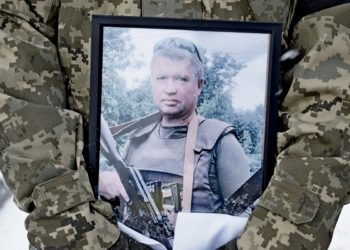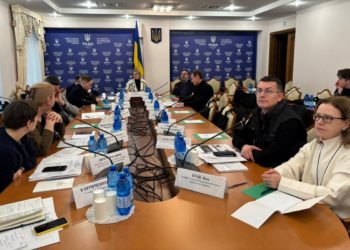“You bring exactly those arguments to the Japanese audience that are important for understanding the situation in Ukraine and for continuing to support our state in this unjust war unleashed by russia,” these words of the Charge d’Affaires of Ukraine in Japan, Oleksandr Semeniuk, became an important recognition of the work of the National Union of Journalists of Ukraine (NUJU) delegation.
For two weeks, the NUJU delegation, led by Sergiy Tomilenko, the President of the Union, and including journalists Olha Vakalo and Svitlana Karpenko from Zaporizhzhia, carried out an advocacy tour of Japan’s cities. In Osaka, Nagasaki, Fukuoka, Kagoshima, Kumamoto, and Koriyama, the delegation held six public meetings, discussing the dangers of the occupation of the Zaporizhzhia NPP, the lives of journalists during the war, and the phenomenon of the Ukrainian front-line press.
The very issue of nuclear power plant safety is a trigger for the Japanese. Even before February 2022, they believed that a major war was impossible because Ukraine had nuclear power plants, and no one would risk their safety. Today, when russia occupied the Zaporizhzhia NPP, we must explain to the world the scale of the threat. Support for Ukraine among ordinary Japanese people remains – albeit not as emotional as in 2022. That is why it is so important to meet with people, including journalists, to form a public demand for support of our state.
The NUJU delegation also showcased the NUJU documentary “Pages of Hope” in Japan, featuring the story of the Trudova Slava newspaper from Orikhiv. This story impressed colleagues from the leading Japanese broadcaster, NHK, who also produced their own television long-form story about the front-line Ukrainian newspaper and its editor, Svitlana Karpenko. This TV story was shown in the morning prime time on the central Japanese television channel.
In parallel, we held a series of official meetings in Tokyo, at the Ministry of Foreign Affairs of Japan and the JICA agency, where we presented the NUJU initiative, which involves the creation of a Technical Fund for Regional Media Support. This involves providing journalists with equipment, ranging from armored cars and protective gear to laptops, cameras, and charging stations. The Embassy of Ukraine in Japan assured that it would help promote this request among Japanese partners.
The members of the delegation also handed over to the Embassy of NUJU human rights booklets and copies of Ukrainian front-line newspapers. They spoke about the work of the Journalists’ Solidarity Centers (JSC), the recording of russian war crimes against journalists, and the solidarity campaign with our colleagues in captivity. The Embassy’s museum room was also replenished with the chevron “War Correspondent” and a guide on the modern history of Ukrainian journalism – “From Maidan to Maidan.”
“It was an honor for us to be photographed at the Embassy with the NUJU flag — a symbol of unity of thousands of Ukrainian journalists, our comrades,” said Sergiy Tomilenko. “As they say in both Ukrainian and Japanese wisdom: ‘Together we are stronger.”

The delegation thanks Ukraine’s friends from the public sector in Japan — the Future Generations Foundation (headed by Jun’ichi Kowaka) and GreenCoop — for the warm invitation and the opportunity to visit a country that remains a great friend of Ukraine.
The NUJU is also strengthening its cooperation with our partner, the Journalists’ Initiative Foundation, to join forces and develop a dialogue with Japanese friends of Ukrainian journalists.







NUJU Information Service
Photo by NUJU

 THE NATIONAL UNION OF
JOURNALISTS OF UKRAINE
THE NATIONAL UNION OF
JOURNALISTS OF UKRAINE















Discussion about this post